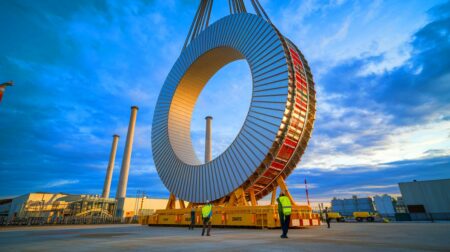As European nations continue transitioning to low-carbon energy sources in their bid to help mitigate global climate change, nuclear power should be playing an increasingly larger role in the continent’s energy plans, several experts say.
Unlike fossil fuel-fired power plants, which currently provide a major share of electricity packages across Europe, nuclear reactors do not emit CO2 and nor do they pollute the air, they note. Admittedly, the mining and refining of uranium ore for producing reactor fuel require large amounts of energy. Yet relatively small amounts of nuclear fuel suffice to operate nuclear power plants for years, which helps offset these initial energy investments, it is argued in support of nuclear energy.
Overall, nuclear power is a form of clean energy with a relatively small carbon footprint and is comparable in its eco-friendliness with solar and wind power. Yet unlike solar and wind power it isn’t dependent on the weather. That makes nuclear power ideal both as a clean energy source and as a reliable provider of constant and plentiful energy to power our modern economies and lifestyles, according to proponents of nuclear energy.
“Nuclear power is a reliable and industrial-scale provider of the stable grid electricity that underpins our advanced technological society and can help bring all of humanity to a safe, healthy, secure life and a vibrant future,” a proponent of nuclear power observed in a comment to Sustainability Times. “Nuclear has plenty of fuel (thousands of years available), copes well with the by-products (small in volume, well-contained) and is safe (high standards getting higher). Hydroelectricity is a great fit with nuclear and weather-based systems are a supplementary source that can also be used to the limits of the grid to cope with their variability.”

Several countries in Central-Eastern Europe are planning to avail themselves of the benefits of increased nuclear power capacity by expanding existing plants or constructing new ones. Hungary, for one, is working to expand its current plant at Paks, whose four ageing 500MW reactors already produce more than 50% of the electrical power generated in the country.
The Paks II project will see the addition of another two reactors (units 5 and 6) of 1,200MW each with construction on them expected to start later this year and in 2019, respectively, for scheduled commissioning in 2025 and 2026. The €12.5 billion expansion will be financed with a €10 billion loan from Russia, whose state-owned nuclear energy corporation Rosatom will provide two new water-cooled VVER-1200 reactors. These latest-generation reactors are highly efficient and meet rigorous safety standards.
“The building will be secured by emergency safety systems, while an outer building with a diameter of 50m will protect the equipment from external hazards. The internal containment will be a cylindrical building with an inner diameter of 44m, and will be capped by a 1m-thick hemispherical shell,” the journal Power Technology explains. “Rosatom will supply the fuel for the new units for ten years,” it adds. “The fuel supply agreement was approved by the Euratom Supply Agency, which is responsible for the secure supply of nuclear fuel in the European Union, on 23 April 2015.”
Safety concerns, which remain high on the list for many people in opposing nuclear energy, are also being addressed at a newly built nuclear plant in Belarus, which has just passed stress tests by investigators of the European Nuclear Safety Regulators Group (ENSREG). The plant, which is under construction at Ostrovets near the Lithuanian border, will similarly feature two 1,200MW reactors supplied by Rosatom. It will be the Eastern European nation’s first nuclear plant and will help Belarus meet its domestic energy needs in a safe, dependable and green manner.

The success of these projects in Central-Eastern Europe may serve to allay any lingering fears about safety issues with nuclear power elsewhere on the continent, experts say. “Today one of the main problems for us (the nuclear industry) is public acceptance,” Dr. Kirill Komarov, first deputy director general of Rosatom, noted at the World Nuclear Exhibition (WNE), which took place in Paris in late June.
“We all should be in a position where we explain to society, local authorities, the government, the politicians why nuclear technology is safe, why it’s reliable, why they shouldn’t have any fears, and that’s a common task for each and every nuclear company and non-commercial nuclear associations,” Komarov added. “The way best to achieve public acceptance is to be proactive [by] providing open information to people [and explaining our rigorous] safety standards.”
After years of decline, the nuclear energy industry is gathering momentum again in parts of Europe, which many energy industry professionals see as a welcome development. Nuclear power is one of the most efficient and reliable sources of energy, they stress. Yet many European nations continue to neglect it owing in large part to what nuclear industry experts regard as misplaced fears about the safety of nuclear power.
“Our goal is to continuously improve our safety levels,” Dominique Miniere, senior executive and vice-president of the French electricity utility company Électricité de France, noted at the Paris WNE. “Our partnerships enable the sharing of lessons from experience and the operation and improvement of our existing nuclear fleet in order to ensure the highest safety levels and consistency between international standards and procedures […) and share the same benchmarks.”
Did you like it? 4.3/5 (22)








